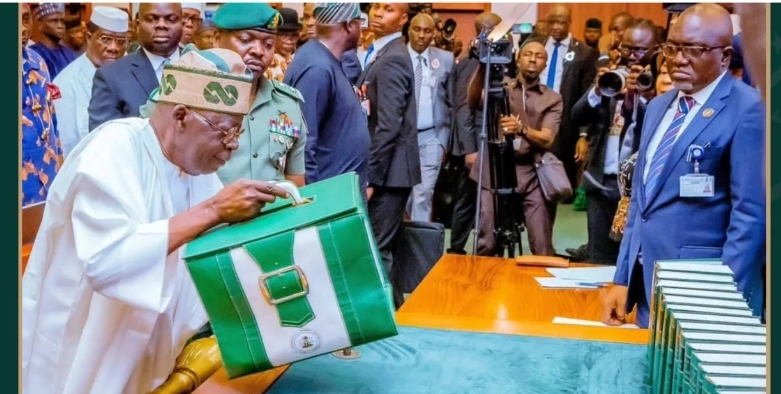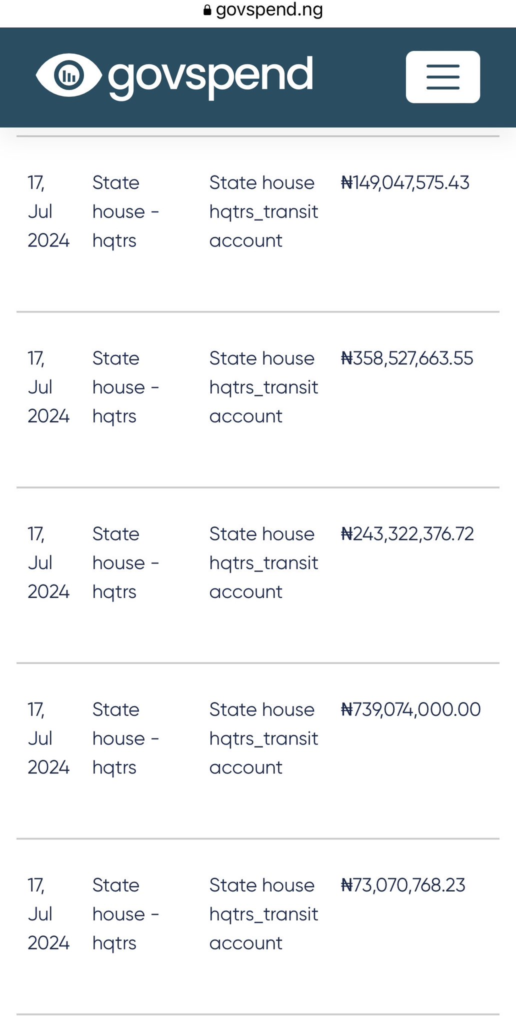
Nigeria’s State House incurred a total expenditure of N1.5 billion on foreign exchange purchases on July 17, 2024, according to a review of the public payment portal, Govspend, powered by BudGIT.
A breakdown of the transactions reveals that multiple payments were made as follows: N149.047 million, N358.527 million, N243.322 million, N739.074 million and N73.070 million.

These transactions cumulatively amount to N1.5 billion, sparking interest in the significant foreign exchange expenditure by the State House on a single day.
On July 17, the State House incurred a total expenditure of N1.562 billion on foreign exchange purchases. Although the transaction was categorised as a forex purchase, historical precedents suggest that such transactions typically facilitate foreign trips by the State House.
Notably, a review of the public payment portal, revealed that President Bola Tinubu previously spent N1.041 billion on his trip to Addis Ababa, Ethiopia, for the African Union summit, hinting at a possible similar purpose for the recent transaction.
According to data from the public payment portal, the Nigerian government incurred a total expenditure of N473 million to sponsor First Lady Oluremi Tinubu’s trips to three countries: UK, Mozambique, and Ethiopia. A breakdown of the expenses reveals that N126.295 million was spent on her trip to London in March 2024, equivalent to $83,967.00.
Further analysis reveals that N144.571 million (approximately $96,118) was spent on her trip to Addis Ababa, Ethiopia, on February 9, 2024 while N202.386 million (approximately $126,834) was spent on her trip to Mozambique in March 2024.
The exchange rate used for this transaction was approximately N1,504 per dollar.
These expenses, combined with the previously reported N126.295 million spent on her London trip, total N473 million. This raises concerns about the transparency and accountability of government spending on such trips, particularly when the President’s trip on February 9, 2024, cost $692,265 (over N1 billion).
The government faces calls to reduce the cost of governance and lamentations about poor revenue.
The cumulative expenditure on these foreign trips sparks questions about the prioritization of government spending.
A former National Vice Chairman North-west of the All Progressives Congress (APC), Salihu Lukman, on Sunday, lamented that the government of President Bola Tinubu appeared to be on a roller coaster of aggrandised spendings amid mass hunger and poverty in the country.
This, he said, was partly responsible for the highly volatile situation in the country.
Lukman in a statement issued Sunday titled, “#EndBadGovernance Campaign: What Next?”, every committed democrat in the country must wake up to this challenge and seek to mobilise Nigerians to direct their anger creatively and positively towards reformation of democratic structures in the country.
He said: “As it is, the President Asiwaju Tinubu’s administration seems to be on a roller coaster of aggrandised spendings amid mass hunger and poverty in the country, which is partly responsible for the highly volatile situation in the country.
“Every committed democrat in the country must wake up to this challenge and seek to mobilise Nigerians to direct their anger creatively and positively towards reformation of democratic structures in the country.”
Nigeria is facing its worst economic crisis in decades, with skyrocketing inflation, a national currency in free-fall and millions of people struggling to buy food. Only two years ago Africa’s biggest economy, Nigeria is projected to drop to fourth place this year.
The pain is widespread. Unions strike to protest salaries of around $20 a month. People die in stampedes, desperate for free sacks of rice. Hospitals are overrun with women wracked by spasms from calcium deficiencies.
Although President Bola Tinubu increased the minimum wage — after strike action and months-long negotiations with labour unions — from N30,000 to N70,000, his government has increased spending for officials at a time of nationwide starvation.
For workers earning the new N70,000, or $43, per month minimum wage, capricious inflation and naira value have inflicted too much damage for the changes to make any difference in their lives.
The crisis is largely believed to be rooted in two major changes implemented by Mr Tinubu, elected 14 months ago: the partial removal of fuel subsidies and the floating of the currency, which together have caused major price rises.
Amnesty International, last week, accused Nigerian security forces of killing at least 21 protesters during a week of economic hardship protests.
Police and other security agencies clamped down on protests after thousands of people joined rallies against government policies and the high cost of living from August 1 to 10.
Security forces denied responsibility for deaths during the protests.
A nation of entrepreneurs, Nigeria’s more than 200 million citizens are skilled at managing in tough circumstances, without the services states usually provide. They generate their own electricity and source their own water. They take up arms and defend their communities when the armed forces cannot. They negotiate with armed kidnappers when family members are abducted.
But right now, their resourcefulness is being stretched to the limit.
Sahara Reporters contributed to this report
